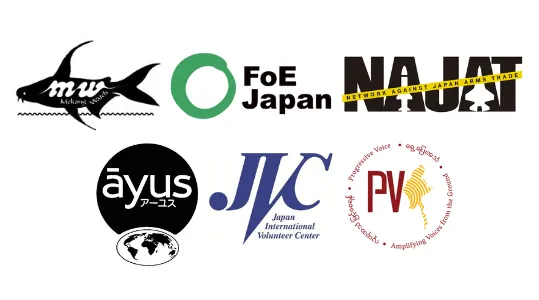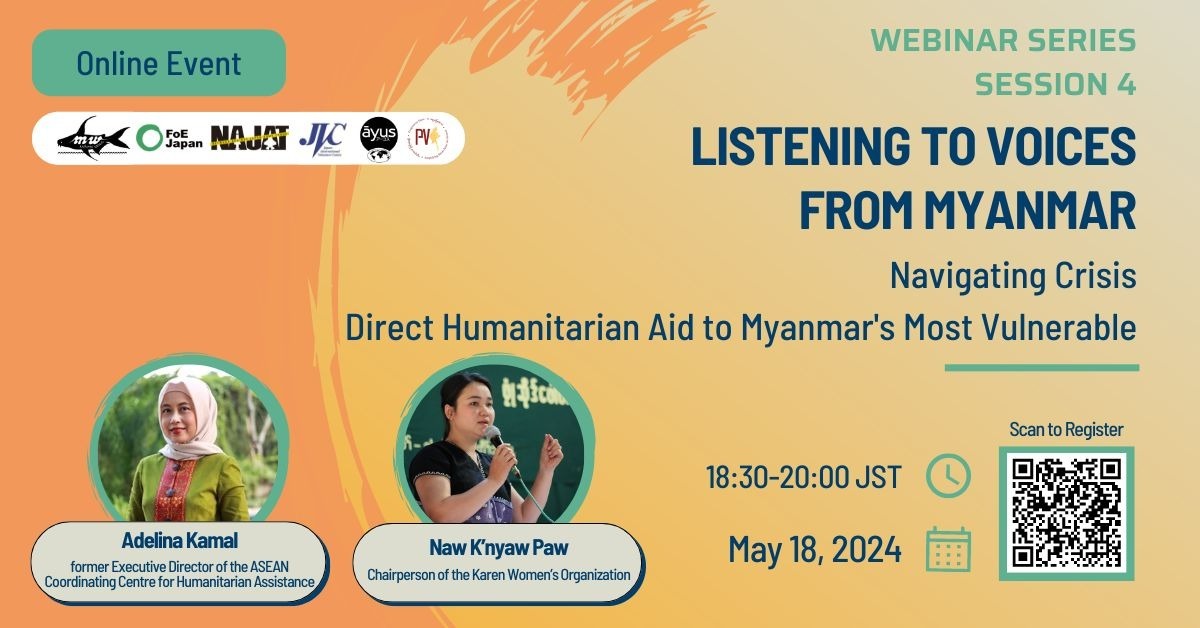Webinar Series: Listening to Voices from Myanmar
03 May 2024

Webinar Series: Listening to Voices from Myanmar
Session 4: Navigating Crisis: Direct Humanitarian Aid to Myanmar’s Most Vulnerable
May 18, 2024 (Saturday) 18:30-20:00 JST

Since the military attempted a coup in Myanmar on February 1, 2021, the country has been thrown into chaos with over 2.9 million internally displaced persons as the military’s oppression and escalating conflicts with ethnic revolutionary organizations intensifies. The death toll from the military crackdown has climbed to nearly 5,000 people. While Japan is the largest aid donor to Myanmar, it has not exerted its influence in the correct manner, while continuing its Official Development Assistance (ODA) after the coup attempt and supplying public funds to businesses related to the military. Moreover, the situation in regions inhabited by ethnic minorities who have long sought autonomy and the voices of people with diverse backgrounds have not been well understood in Japan.
This webinar seminars is co-hosted by the #NoMoreBusinessWithJunta campaign organizers (Mekong Watch, ayus:Network of Buddhists Volunteers on International Cooperation, Friends of the Earth Japan, Japan International Volunteer Center (JVC), and Network Against Japan Arms Trade (NAJAT)) with Progressive Voice. The webinar series intends to amplify voices of the people of Myanmar to Japan. We will discuss and hear ground updates, historical background of conflicts, situation in ethnic minority areas, and what the civil society from Myanmar expects from the Japanese government and society, featuring Myanmar activists and NGO staff as guest speakers.
Session 4: Navigating Crisis: Direct Humanitarian Aid to Myanmar’s Most Vulnerable
The crisis in Myanmar has escalated to an unparalleled level with millions displaced as a result of the Myanmar military’s nationwide campaign of atrocities, particularly intensifying since the February 2021 coup attempt. Reports from local organizations suggest an even more alarming reality with figures that double numbers provided by the UN. Amid the crisis, Japan has contributed US$109.5 million in humanitarian aid since February 2021. However, concerns are growing over the Myanmar military’s manipulation of aid, which could benefit them politically and militarily. Local frontline humanitarians have raised alarms that the aid is failing to reach those most in need in the areas hardest hit by the Myanmar military’s atrocities. Meanwhile, ethnic resistance organizations continue to gain territorial control, including in key border towns. direct support through local channels, in particular border based aid provision, has never been more critical. These discussions are highly relevant to Japan which, in March, committed further US$37 million to aid Myanmar.
In our fourth session of the webinar series “Listening to Voices from Myanmar”, Naw K’nyaw Paw, Chairperson of the Karen Women’s Organization, will share the ground realities in Karen State as displacement and suffering mounts, offering insights into the work of local frontline humanitarians and their calls to the Japanese government and the wider international community. Joining her is Adelina Kamal, a distinguished regional humanitarian and the former Executive Director of the ASEAN Coordinating Centre for Humanitarian Assistance (AHA Centre), who will share her expert insights into the challenges and solutions in delivering aid directly to those in dire need that centers local frontline humanitarians resisting the Myanmar military’s attempt to rule Myanmar with violence.
Date and Time
May 18, 2024 (Saturday) 18:30-20:00 JST
Where
Online Event (Zoom Webinar)
Language
English (with simultaneous Japanese interpretation)
Participation Fee
Free
Registration Form
https://us06web.zoom.us/webinar/register/WN_OJltJ224TH6ENvDhHjduBQ
Speaker
- Naw K’nyaw Paw
- Adelina Kamal Hsai
Speaker Profiles
- Naw K’nyaw Paw
Naw K’nyaw Paw is the Chairperson of the Karen Women’s Organisation. She was born on the Thai-Burmese border and became a refugee at the age of 11. She has worked for gender justice, social justice, human rights, democracy, and child protection for more than 20 years and has spoken at the United Nations to advocate for women, refugees, and internally displaced persons. K’nyaw Paw has received many awards and accolades for her dedication. Among these are the Women of Courage Award from the US Department of State in 2019, and the Ginetta Sagan Award from Amnesty International in 2021 which recognizes women working to protect the liberty and lives of women and children in areas where human rights violations are widespread. - Adelina Kamal
Adelina Kamal is a humanitarian, a disaster management professional, and an independent analyst and strategist on international policy development, with more than a quarter century experience with ASEAN, leading the AHA Centre for five years as its first female Executive Director during the period of 2017 – 2021, and prior to that, working with the ASEAN Headquarters based in Jakarta. After leaving the AHA Centre, Adelina has been consulting for governments, international and regional organizations. She currently sits as a voting board member of the Melbourne-based Centre for Humanitarian Leadership Executive Committee since August 2023 and a steering committee member of the Southeast Asian Women Peace Mediators since June 2023. Adelina has also been a member of the Advisory Group of London-based Overseas Development Institute Humanitarian Policy Group since December 2020, and a regular guest lecturer at the University of Indonesia’s Master’s degree programme in Disaster Management since March 2022.
Co-organized by
#NoMoreBusinessWithJunta campaign organizers (Mekong Watch, ayus:Network of Buddhists Volunteers on International Cooperation, Friends of the Earth Japan, Japan International Volunteer Center (JVC), and Network Against Japan Arms Trade (NAJAT)) with Progressive Voice
Contact
- Mekong Watch [email protected]
- Relevant resources
- Ministry of Foreign Affairs press release, “Additional humanitarian assistance to the people of Myanmar affected by the coup d’etat” (March 8, 2024)
https://www.mofa.go.jp/press/release/press1e_000494.html - UNHCHR press briefing notes, “Myanmar: Dire humanitarian and human rights situation compounded by military’s restrictions on aid” (June 30, 2023)
https://www.ohchr.org/en/press-briefing-notes/2023/06/myanmar-dire-humanitarian-and-human-rights-situation-compounded - Karen Peace Support Network, “On the Third Anniversary of the Coup, KPSN Calls for Urgent Humanitarian Assistance in Kawthoolei” (January 31, 2024)
https://www.karenpeace.org/report/on-the-third-anniversary-of-the-coup-kpsn-calls-for-urgent-humanitarian-assistance-in-kawthoolei/
Announcements
21 May 2025
Open letter: Malaysia must lead ASEAN with principle, not hypocrisy, to address the Myanmar crisis

Progressive Voice is a participatory rights-based policy research and advocacy organization rooted in civil society, that maintains strong networks and relationships with grassroots organizations and community-based organizations throughout Myanmar. It acts as a bridge to the international community and international policymakers by amplifying voices from the ground, and advocating for a rights-based policy narrative.